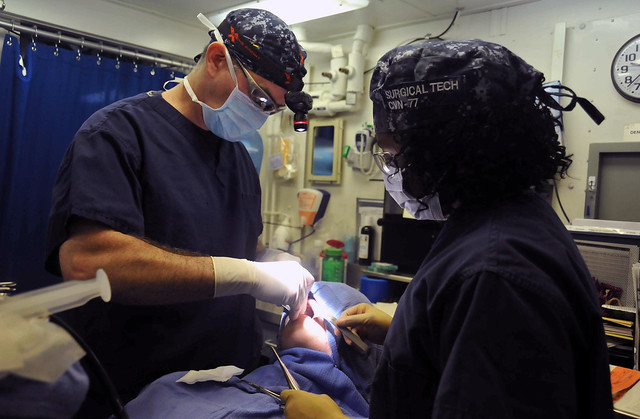An interesting article titled “Current practice in mandibular third molar surgery. A national survey of British Association of Oral Surgeons membership,” written by Devine et al. appears in Oral Surgery in 2017 (vol. 10, pp. 11-19). The article discuss the current practices among member of the British Association of Oral Surgeons (BAOS) for wisdom teeth surgery.
The authors conducted a survey of members of the British Association of Oral Surgeons from March to June 2015 where 250 of the 520 total members (48.1%) responded. The most common grade of the respondents was specialty dentist (25.2%), primary care oral surgeon (18.4%), associate specialist (18.0%) and oral surgery consultant (13.4%). About 17% of those who responded said that wisdom teeth removal comprises 75% of their workload and about 36% of those who responded said that wisdom teeth removal comprises between 50 and 75% of their workload. On average, each respondent performed 19 wisdom teeth surgeries each week with eight of these 19 using local anesthesia alone, five of these 19 using intravenous sedation, and six of these 19 using general anesthesia. The survey indicated that the decision to use either intravenous sedation or general anesthesia was often based on the clinical environment and facilities were surgery was performed.
About 53.4% of the respondents indicated they had difficulty accessing a cone beam computed tomography (CBCT) scanner with the most common reasons for lack of access being distance (28.2%), cost (27.2%), and the amount of time required to do the scan (21.8%). Respondents indicated that a CBCT scanner was not always available in the National Health Service (NHS) in the U.K. in a primary care setting and a referral would have to be made to another center. A total of 73% respondents indicated they would recommended coronectomy for high risk wisdom teeth removal cases after a CBCT scan. The authors suggest that a CBCT scan should be performed on a case by case basis and particularly in cases where high risk features are noted on a panoramic radiograph.
There were also some interesting result regarding the informed consent process. About 57% of respondent said they do a two-stage informed consent process where an initial informed consent is obtained at a separate consultation visit and then again obtained on the same day as surgery. During the consent process, 64% of respondents indicated they warned of inferior alveolar nerve and lingual nerve injuries including numbness, altered sensation, and pain. About 0.5% of respondents told patients about the chance of nerve injury if the surgery was determined to be high risk. About 4% of respondents said they never gave any type of informed consent prior to surgery. The authors say the reason for the majority using a two-stage informed consent process is because they recognize that patients ability to remember information given by doctors is not very good and it is of benefit to discuss the risks and benefits a second time.
The most popular type of anesthesia given was a lidocaine inferior dental block supplemented with a buccal infiltration with lidocaine or articaine which accounted for 88.8% of all cases. In 82% of the wisdom teeth surgery cases the surgeons did not arrange for a visit after the extractions unless the patients later developed complications. In the other 18% of the cases a telephone call was made to the patient within 2 days after surgery to check up on the healing process. The respondents indicated temporary inferior alveolar nerve injury and lingual nerve injury occurred in 2% and 1% of all cases of wisdom teeth removal respectively. The respondents indicated permanent inferior alveolar nerve injury and lingual nerve injury occurred in 0.4% and 0.1% of all cases of wisdom teeth removal respectively. It is believed the amount of nerve injuries may have been under reported due to lack of follow-up appointments with the person who performed the surgery and the fact that other studies have indicated higher incidence of both inferior alveolar nerve and lingual nerve injuries.

This study seems to indicate that they way oral surgeons practice removing wisdom teeth in the U.K. is a bit different than in the U.S. Based on speculation, it would seem those in the U.K. perform more wisdom teeth surgeries under general anesthesia than in the U.S. In the U.S. it seems common to have an in person follow-up visit after surgery but this seems to only occur in the U.K. if a complication develops and even then the same surgeon may not be the one seen.
